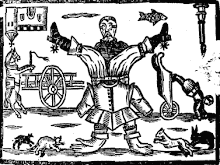I was reading this article and came across this sentence: "I was part of that history -- it doesn’t matter on what side; that was a pure accident."
Goff's basic premise is that there will always be war and conflict and fighting and taking up of weapons - which certainly seems to be true, part of the human condition thus far, anyway. but the "accident" part is odd - we (the "left") think that we (the imperialists) have the choice to be a part of the violence or not. we can join the armed forces or not. If you do, the left says you are a meathead. if you don't, the left congratulates you and we all sit around wringing our hands, in the quiet comfort of our bloodsoakedoil-heated houses or SUVs, wearing clothes from The Gap and wondering why "They" hate us. He states this more clearly further down the page: "... if you so much as breathe in the United States of America, you are as much a part of the body of actually-existing imperialism as any nervous, trigger-happy Marine killing a family at a Baghdad roadblock."
I will not join the armed forces, haven't even uttered a word of deliberate (racism is insidious) anti-arab sentiment but I am equally complicit in representing the people that I was born to. If there really will always be war, if conflict is human, then arguing to stop the war is futile and pointless. We should be arguing on behalf of the war, urging it to its logical conclusion. But if the colonizers are ejected, their empire crushed, who next to take our place? Goff addresses the reader as "soldier," which includes anyone who lives on this side of the Imperial fence. Here he shares a worldview with Dubya. "If you aren't fighting against X you are with Y." And perhaps in a sense he is right.
But, what if? What if we don't see the human condition as static? What if we see a gradual shift taking place over tens of thousands of years that holds the promise of enlightened peaceful human social conditions? What of us idealists who think there can be another way? Sure, we may be on a side by birth, but if birth is an accident, why does it have to stay that way? Can a nation of colonists help but create more colonies? Can we create sovereignty on all levels from the personal to the national?
Goff also says:
"You will not win with non-profits. You will not win with non-violence. You will not win with non-committal. To win you must become effective, and when you do, you will be attacked. Then you will fight or you will be exterminated. You may even fight and still be exterminated. No guarantees. We are responsible.
You will never make a revolution behind the bourgeoisie’s back, because the bourgeoisie has eyes in the back of its panopticon head. You will never make a revolution while the ruling class sleeps, because it never sleeps. You will not sneak up on necessity, and no one can evade it.
I agree. Humans don't like change. Those who hoarde and wield great power don't give it up willingly. So how do we create a third side? A second front? A side for those who don't want to "protect our way of life," but to tear it down, and not put anything at all back in its place?
Goff concludes, "It’s a system, an expression of an immensely complex and dynamic web of relationships and realities, and it will default to its basic program -- capital accumulation -- again and again and again, until it is destroyed." "It" being the United States? If we are all soldiers, what must our weapons be? Are guns the only option? When the time comes to actually take up arms, what will the sides actually be? He says to "abandon yourself to unity," but what will that unity look like? What will it be based on?
Perhaps this is a question we can't answer right now. But maybe this is why so much of the "left" is not prepared for violence. The war machine hasn't come for us yet, so we still have the luxury of looking at ideals and alternative solutions. We still have time for denial.
So if Goff is right, and we will need to use violence, should we wait for them to come after us?
Ward Churchill said, "You can gauge the effectiveness—real or potential at least—of any line of activity by the degree of severity of repression visited upon it by the state." The implication being we need to pick a fight with oppression. That's very
difficult to organize.
Sooner or later the Imperialists will go too far, will push even the least radicalized of us to realize that we're no longer free and that if we want to be we're going to have to fight for it.
